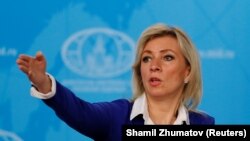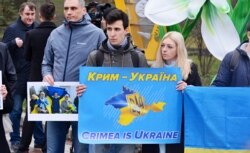On October 14, Russian Foreign Ministry spokesperson Maria Zakharova spoke to reporters on the sidelines of the third Eurasian Women’s Forum, held in St. Petersburg. When asked about the European Union’s decision to extend targeted sanctions against Russia, she replied:
“Let me remind you about our fundamental position that is rooted in international law: Any decisions on sanctions bypassing the (United Nations) Security Council are illegitimate from the perspective of international law.”
This is false.
Ever since the EU and other countries first levied sanctions against Russia for its 2014 invasion and occupation of Crimea, and for fomenting a secessionist war in Ukraine’s eastern Donbas region, Russian officials have tried to claim the sanctions were illegal.
Russia’s rationale is that the sanctions are unilateral and not passed by the United Nations Security Council, in which Russia holds a permanent seat. Polygraph.info covered the topic earlier, but a refresher is in order with the EU’s added sanctions on security officers, prosecutors and judges who are enforcing the Crimea occupation.
The sanctions targeting Russia were passed under the EU’s own internal laws and regulations. They mainly include travel bans and asset freezes on Russian nationals. They are not founded in international law but the laws of the EU and its members.
The insinuation that European states don’t have the right to limit the activities of foreign nationals on their soil under international law is absurd. Moreover, Russia has levied counter-sanctions in response to the EU and others, mainly consisting of import bans on EU food products or entry bans for certain individuals.
Russia’s counter-sanctions also bypass the United Nations Security Council.
Sanctions levied by the Security Council are typically binding on all U.N. member states, whereas non-U.N. sanctions, sometimes called unilateral sanctions, are not. EU sanctions are only binding on its member states.
There is no international law prohibiting unilateral sanctions, although in some cases such sanctions have come under criticism from developing nations. EU sanctions, however, are tailored to avoid undue harm to the broader population.
“EU sanctions are carefully targeted and designed to be proportionate to the objectives they seek to achieve,” the European Commission website explains.
“As such, they are aimed at those responsible for the policies or actions the EU wants to influence, while reducing as much as possible any unintended consequences.”
As for the limits, the EU Commission states:
“While EU sanctions inherently have an effect in non-EU countries, as they are a foreign policy tool, the measures apply only within EU jurisdiction. In other words, the obligations they impose are binding on EU nationals or persons located in the EU or doing business here.”
EU sanctions require unanimous consent from the Council of the European Union, whose members represent all 27 states.
The sanctions that tend to garner criticism in the arena of international law are what’s known as extraterritorial sanctions, which try to regulate the activities of actors beyond just the country being punished.
U.S. sanctions on Iran for its nuclear activities are one example. The U.S. not only sanctioned Iran but sought to bar other states from doing business with Iran, as well.
As such, non-U.S. firms doing business with Iran could face U.S. punishment. The EU sanctions related to Crimea and Donbas, however, are not extraterritorial.
According to the Council of the European Union, as of October 11, the expanded EU sanctions now apply to 185 individuals and 48 entities. These people and entities are cited for “actively supporting actions and implementing policies that undermine or threaten the territorial integrity, sovereignty and independence of Ukraine.”
The latest targets include judges, law enforcement officers, prosecutors, politicians and business owners.







